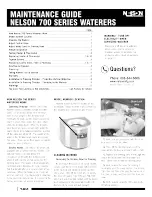
28
External Inspection & Cleaning of the
Base-Ring Filter
1. At least annually, check the base-ring filter (Figure 28)
for any dust or debris that may have accumulated on
the filter screen. NOTE: If the water heater is located
in an area that is subjected to lint and dirt, it may be
necessary to check the base-ring filter more frequently.
2. Follow the Lighting Instructions to turn off the water
heater and allow it to cool for 10 minutes before
attempting to clean the base-ring filter.
3. Use a vacuum cleaner with a hose attachment to
remove any dust or debris that may have accumulated
on the filter. NOTE: If unable to inspect or clean the
base-ring filter, follow the “Cleaning the Combustion
Chamber and Flame-arrestor” instructions.
4. After the base-ring filter has been cleaned, follow
the Lighting Instructions to return the water heater to
service.
Cleaning the Combustion Chamber and
Flame-arrestor
1. Follow procedure outlined in “Removing the Manifold/
Burner Assembly”.
2. Use a vacuum cleaner/shop vac to remove all loose
debris in the combustion chamber (Figure 28). Use
compressed air to clear any dust or debris that may
have accumulated in the flame-arrestor.
DOOR GASKET
FLAME ARRESTOR
COMBUSTION CHAMBER
BASE-RING
FILTER
FIGURE 28.
3. Reassemble following the procedure under “Replacing
the Manifold/Burner Assembly”.
Replacing the Manifold/Burner Assembly
WARNING
Explosion Hazard
• Tighten both manifold door screws securely.
• Remove any fiberglass between gasket and
combustion chamber.
• Replace viewport if glass is missing or damaged.
•
removed.
• Replace door gasket if damaged.
• Failure to follow these instructions can result in
death, explosion, or fire.
1. Check the door gasket for damage or imbedded debris
prior to installation (Figure 28).
2. Inspect the viewport for damage and replace as
required (Figure 23).
3. Insert the new manifold/burner assembly into the
burner compartment, making sure that the tab of the
manifold tube engages the slot of the bracket inside
the combustion chamber (Figure 29).
4. Inspect the door gasket and make sure there is no
fiberglass insulation between the gasket and the
combustion chamber (Figure 28).
5. Tighten the two screws that secure the manifold/burner
assembly to the combustion chamber. (Use a 1/4” nut
driver.) There should be no space between the gasket
part of the manifold door and combustion chamber
IMPORTANT: Do not operate the water heater if
the door gasket does not create a seal between the
manifold door and the combustion chamber.
6. Reconnect the manifold tube (3/4” wrench) and pilot
tube (7/16” wrench) to the gas control valve/thermostat
(Figure 22). Do not cross-thread or apply any thread
sealant to the fittings.
IMPORTANT: If you were supplied with a new ferrule
nut in a parts kit, follow these steps to connect the
pilot tube:
1.) Install the ferrule nut into the gas valve at the pilot
tube location, hand tight only. 2.) Insert the pilot tube
into the ferrule nut until the tube bottoms out, then
tighten the nut with a 7/16” wrench until the crimp
connection seals to the pilot tube. 3.) Continue to
tighten until the nut is tight in the gas valve.
NOTE: L.P. Gas systems use reverse (left-hand) threads
on the manifold tube.
Replace manifold component block if missing or













































